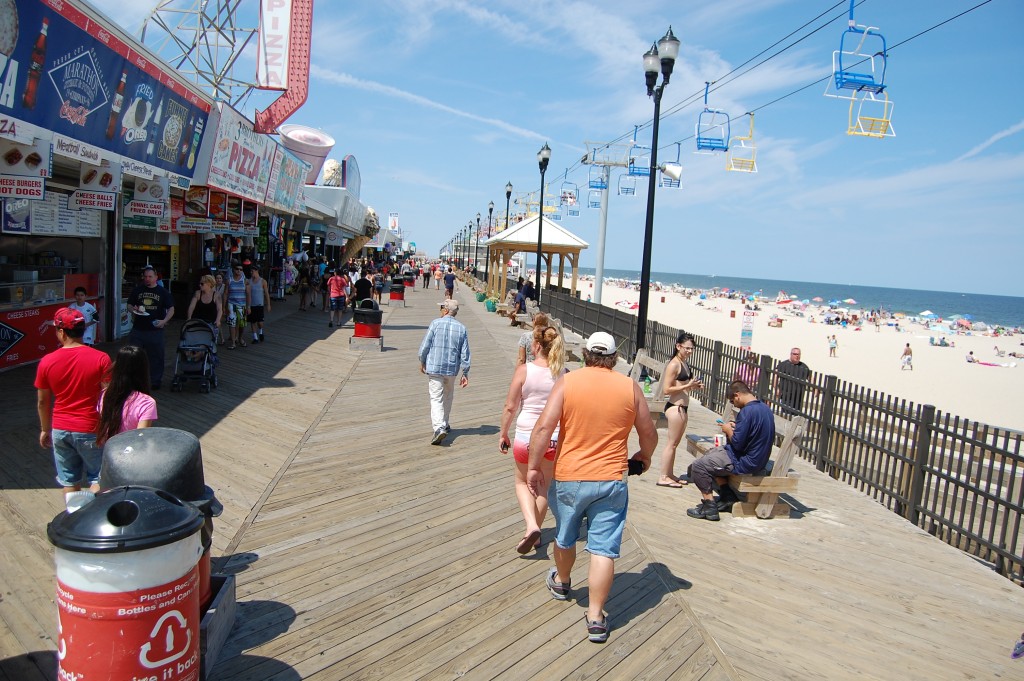Seaside Heights officials have spent what now amounts to years trying to shed its image as a hard-partying town filled with as many opportunities for vice as grains of sand on the beach.
Now, with a new governor, Phil Murphy, having been elected who has made the legalization of recreational marijuana a top priority, those same officials are concerned about what the change in the law could mean for the town, which has made a concerted effort to drive out seedy motels and boardwalk businesses that have caused trouble. The troubled inns and boardwalk businesses selling t-shirts with profane writing have since begun to be replaced by upscale condominiums, brightly-lot boardwalk boutiques and family-friendly events all summer long. Could adding marijuana to the mix put a damper on the progress?
“We want to be a family resort, period,” said Mayor Anthony Vaz, who has spearheaded the revitalization effort. “We recognize there are laws we have to obey, but we will not be excited about it.”
As it currently stands, smoking is banned on the borough’s beach and boardwalk. Marijuana legalization is not likely to infringe on the state’s Smoke Free Air Act, and even New Jersey’s medical marijuana law allows towns to restrict its use in parks, beaches and boardwalk areas.
The question, then, may come down to zoning. Would a marijuana dispensary be able to open up on the boardwalk or a few blocks away, and is there a risk the town could become a resort for out-of-state residents looking to get high at the beach? It’s a question officials say they have yet to formally discuss, however they are aware they’ll need to do so down the road.
“If this goes into law, there will have to be some controls,” said Vaz, who will bring the issue to the attention of the borough council if and when a legalization measure goes in effect.
Vaz said he sees many problems in Colorado, where recreational pot has been legal since Jan. 2014. Some studies have pointed to an uptick in impaired driving, though there is no marijuana intoxication test as accurate as a Breathalyzer, and advocates of legalization say a positive test on a driver could mean the person smoked weeks, or even months, earlier.
A 2014 study by the American Civil Liberties Union showed that Seaside Heights had a per-capita marijuana arrest rate of 1,188 per 100,000 equivalent residents, though the figures are likely skewed by the summer tourism influx. In nearby Seaside Park, the borough’s arrest rate led the entire state of New Jersey, with 5,028 arrests per 100,000 residents. The Ocean County average was 208 per 100,000 residents.
Colorado’s zoning policies have generated controversy there. In Denver, specifically, there are regulations that prohibit dispensaries from being operated in mixed-use or residential areas, the Denver Post reported. Specifically, they are allowed to operate in commercial and industrial zones. In Seaside Heights, the boardwalk has its own zone – the Resort Recreational Zone – which is separate from the business zone.
A University of Colorado study found that cities have, indeed, formulated regulations restricting where dispensaries can operate. In the university’s report, researchers focused on how the businesses are often pushed into minority neighborhoods – a largely moot point in a small, and not particular diverse town such as Seaside Heights – but also focused on local control of the pot business.
“Though technically medical marijuana dispensaries provide a healthcare service, they have historically been required to adopt the same zoning restrictions as businesses that sell alcohol, pornography, and firearms,” said Jeremy Németh, Associate Professor and Chair of the Department of Planning and Design. “Generally, stores that sell these types of ‘vices’ are prohibited from locating in residential or mixed-use neighborhoods and are pushed into much less affluent neighborhoods.”
So-called “proximity buffers” were worked into Colorado’s law, allowing towns to restrict the sale of marijuana near parks, beaches and schools – similar to the regulations included in New Jersey’s medical law.
“As medical marijuana has become legal in 23 states and D.C., municipalities must determine where these businesses will be allowed to operate,” said Németh. “I encourage my students, and city planners, to think about the impacts zoning regulations have on the entire community, not just adopt regulations that have been in place for other vices.”
But for Seaside Heights, a town on the mend after Superstorm Sandy and several years of what many consider negative publicity generated by MTV’s “Jersey Shore,” the priority, officials said, is keeping its clientele family-oriented.
“If it becomes a law, we will abide by whatever the law says, but we won’t have to like it,” said Vaz.

Advertisement

Seaside Heights & Seaside Park
Seaside Heights’ 114-Year-Old Carousel Should Be Spinning Again This Summer

Police, Fire & Courts
Brick to Build Barrier Island Emergency Services Complex After Trailer Collapse

Shore Environment
Nor’Easter Threatens Jersey Shore This Weekend

Seaside Heights & Seaside Park
Seaside Heights Food Truck, Music Festival Planned For June: Here’s Who’ll Be There








